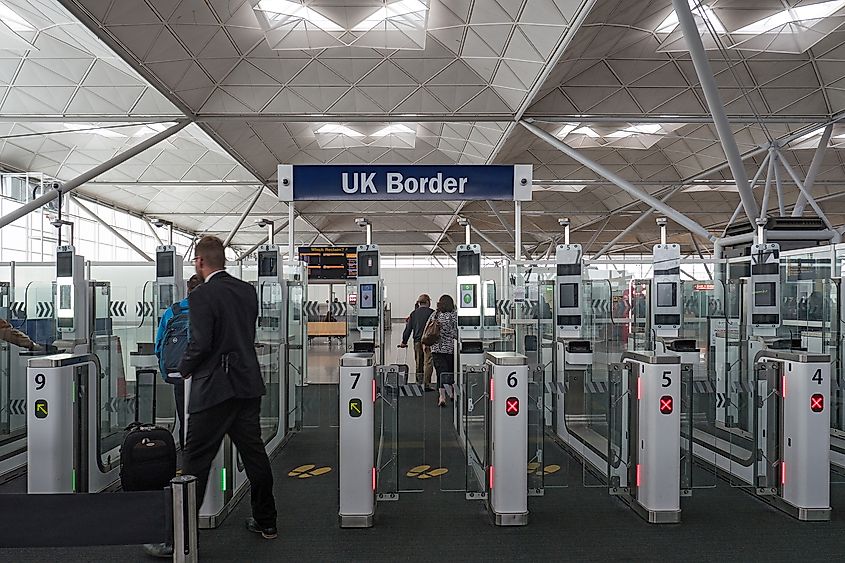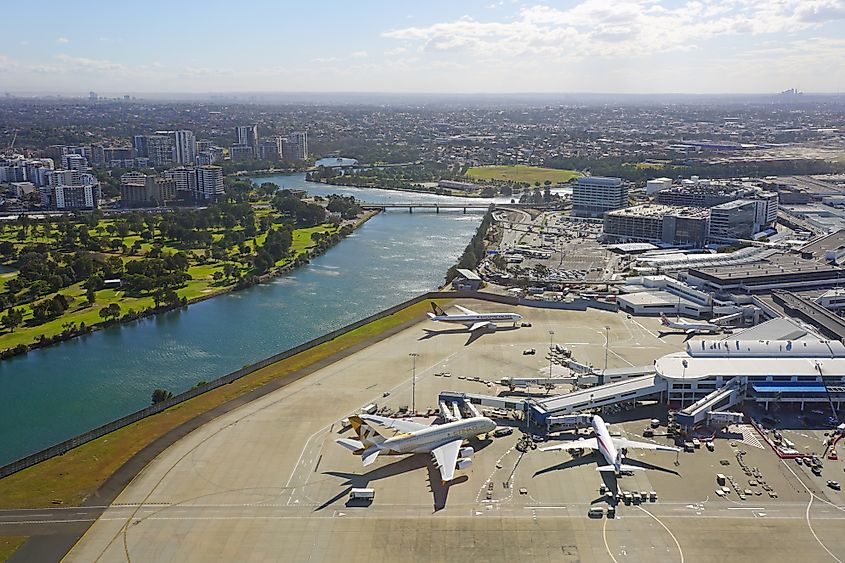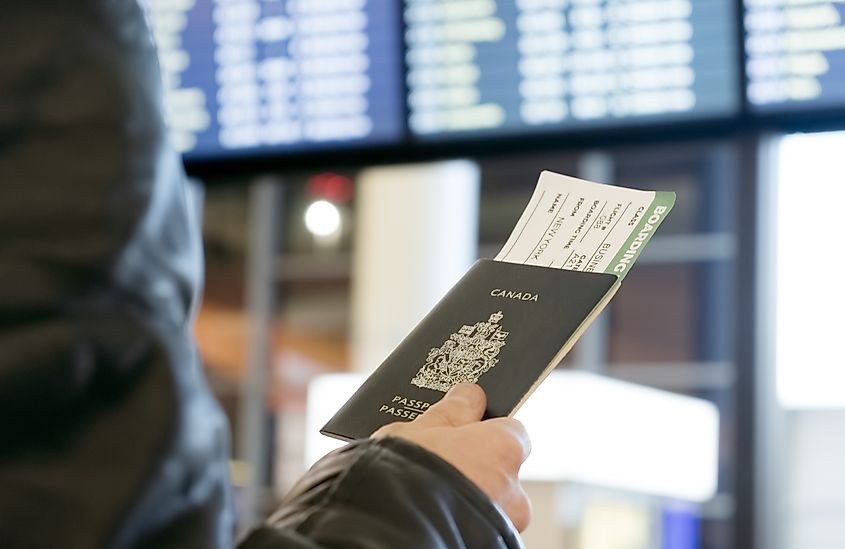
The Strongest Passports in the World
In 2006, passport holders, on average, could visit a mere 58 countries visa-free. As of 2024, that number has leaped to an average of 111, showing rising willingness among countries to increase global mobility and strengthen diplomatic ties, a testament to evolving international cooperation. In particular, Singapore has the strongest passport in the world, with its passport offering visa-free access to 195 destinations. France, Germany, Italy, Japan, and Spain are second, with 194 countries visa-free.
Top 10 Ranks For Countries With The Strongest Passports
| Rank | Country | # of Destinations |
|---|---|---|
| 1 | Singapore | 195 |
| 2 | France, Germany, Italy, Japan, Spain | 194 |
| 3 | Austria, Finland, Ireland, Luxembourg, Netherlands, South Korea, Sweden | 193 |
| 4 | Belgium, Denmark, United Kingdom | 192 |
| 5 | Norway, Portugal, Switzerland | 191 |
| 6 | Australia, Greece, Malta, New Zealand | 190 |
| 7 | Canada, Czechia, Hungary, Poland | 189 |
| 8 | United States | 188 |
| 9 | Estonia, Lithuania, United Arab Emirates | 187 |
| 10 | Latvia, Slovakia, Slovenia | 186 |
1. Singapore (195 destinations)

In February 2024, Singapore established new visa agreements with China and Iran, which solidified the Singaporean passport's status as the most powerful in the world. Singaporeans can now visit China without needing a visa for up to 15 days and Iran for up to 15 days. Over the past decade, Singapore has made significant strides in expanding the number of visa-free countries available to its citizens. Since 2013, Singapore has climbed from sixth to first place in global passport rankings, adding more than 25 countries to its visa-free destination list.
2. France, Germany, Italy, Japan, Spain (194 destinations)

France, Germany, Italy, Japan, and Spain currently enjoy visa-free access to 194 countries, placing them second overall in terms of most powerful passports, just behind Singapore. As members of the European Union, France, Germany, Italy, and Spain can travel freely to all 27 EU member states and have the right to live and work across these countries. Moreover, positive relations with countries across the globe promote visa-free entry to many destinations. Meanwhile, the Japanese passport, which held the top ranking from 2018 to 2022, fell to second place in 2024, demonstrating the dynamic changes that take place in international relations.
3. Austria, Finland, Ireland, Luxembourg, Netherlands, South Korea, Sweden (193 destinations)

Austria, Finland, Ireland, Luxembourg, The Netherlands, South Korea, and Sweden currently hold visa-free access to 193 countries, ranking them third overall. Also, members of the European Union, Austria, Finland, Ireland, Luxembourg, the Netherlands, and Sweden similarly enjoy the freedom to travel, work, and live in all 27 EU member states. South Korea, with its strong diplomatic ties and global engagement, has significantly expanded its visa-free access in recent years. However, it has also banned its citizens from traveling to certain countries, such as Yemen, Ukraine, Syria, Sudan, Iraq, and Haiti, due to safety concerns.
4. Belgium, Denmark, United Kingdom (192 destinations)

Currently, Belgium, Denmark, and the United Kingdom have visa-free access to 192 countries, placing them fourth. Belgium and Denmark, through their membership in the European Union, have also enjoyed the ability to travel, work, and reside in the 27 EU member states. Additionally, Denmark, as a Nordic country, does not require travel or identity documentation to visit other Nordic countries, thanks to the Nordic Passport Union. Meanwhile, the United Kingdom, despite its exit from the EU in 2020, continues to maintain strong international connections and travel options for its citizens.
5. Norway, Portugal, Switzerland (191 destinations)

Currently, Norway, Portugal, and Switzerland enjoy visa-free access to 191 countries, ranking them all in fifth place. As part of the EU, Norway and Portugal maintain the ability to travel, work, and reside across EU member states as well. Additionally, Portugal, recognized for its proactive approach, has signed numerous agreements with countries in Africa and Latin America to strengthen ties and expand travel options for its citizens. Meanwhile, Switzerland, although not an EU member, benefits from a range of bilateral agreements that facilitate free movement and access to various countries.
6. Australia, Greece, Malta, New Zealand (190 destinations)

Currently, Australia, Greece, Malta, and New Zealand have visa-free access to 190 countries, ranking them sixth. Australia and New Zealand maintain strong ties through the Trans-Tasman Travel Arrangement, allowing citizens to live and work freely in each other's country. Greece, as an EU member, benefits from extensive travel and work options across all EU member states. Notably, Greece has also established agreements with countries in the Balkans to increase diplomatic relations. Malta, on the other hand, has established an international political stance characterized by impartiality and neutrality and maintains diplomatic missions in over a hundred countries worldwide, which has contributed to its passport strength and visa-free country access.
7. Canada, Czechia, Hungary, Poland (189 destinations)

Canada, Czechia, Hungary, and Poland possess visa-free access to 189 countries, ranking them seventh in terms of most powerful passports. Canada maintains a strong global presence through its extensive diplomatic network and active participation in international organizations, facilitating travel for its citizens and passport holders. This has been the case for many years, and Canada is a common name on lists of the strongest passports. Czechia, as a member of the EU, benefits from free movement within the EU and has developed strategic partnerships with neighboring countries to enhance its travel options. Hungary and Poland also leverage their EU membership to secure favorable visa agreements, promoting regional travel and collaboration.
8. United States (188 destinations)

In recent years, concerns about security and undocumented immigration have led the United States to hesitate in expanding visa-free access through bilateral agreements, resulting in a somewhat stagnant situation. Notably, Brazil has announced that starting in 2025, US citizens will require an e-visa to enter the country, reflecting the reciprocal visa requirements that Brazilian citizens face when traveling to the United States. In the past decade, only Poland, Croatia, and Chile have been added to the Visa Waiver Program list by the United States, highlighting the country's stringent visa approach.
9. Estonia, Lithuania, United Arab Emirates (187 destinations)

Currently, Estonia, Lithuania, and the United Arab Emirates enjoy visa-free access to 187 countries, landing them in ninth place. Also members of the European Union, Estonia, and Lithuania benefit from free movement rights across the EU. The United Arab Emirates has actively pursued diplomatic relations worldwide, leading to numerous agreements that enhance travel options for its citizens. As part of both the UN and the Arab League, it maintains diplomatic relations with over 60 countries. This extensive network of diplomatic ties has enabled these countries to secure favorable travel conditions and strengthen their global presence.
10. Latvia, Slovakia, Slovenia (186 destinations)

Currently, Latvia, Slovakia, and Slovenia have visa-free access to 186 countries, placing them tenth in terms of passport strength. As EU members, Latvia and Slovakia also benefit from the ability to travel, work, and reside freely across the EU. Slovenia, recognized for its strong diplomatic engagement, has actively pursued partnerships beyond the EU, including agreements with countries in the Balkans and the Western Balkans to promote regional stability and cooperation. These strategic initiatives have enhanced their passport strength and bolstered economic and cultural ties with neighboring regions.
Final Thoughts
Generally speaking, the rankings of the world's strongest passports reveal significant progress in global mobility and international relations. Countries like Singapore and Portugal demonstrate the impact of proactive diplomatic efforts, resulting in broader, visa-free access. In contrast, the United States, while historically powerful, has faced challenges in expanding its visa-free agreements due to internal security and immigration concerns. In the coming years, passport holders will increasingly benefit from the outcomes of diplomatic relations and the development of visa agreements.











